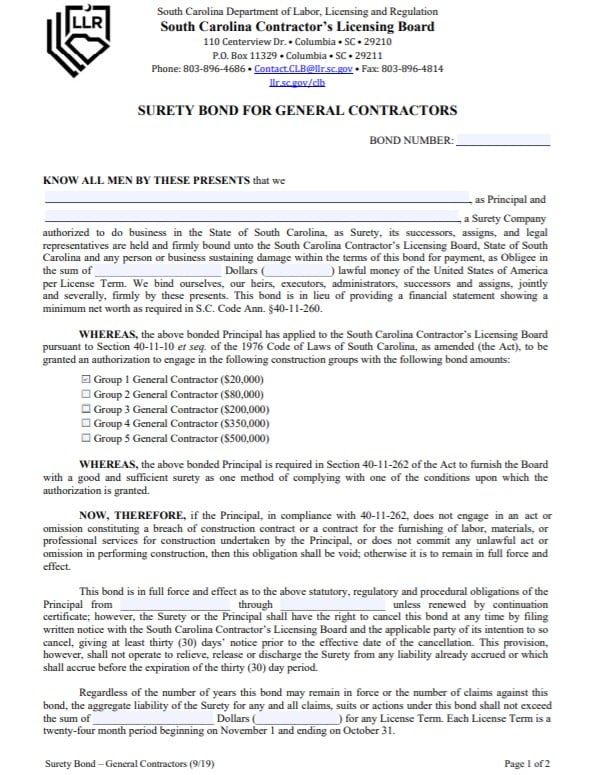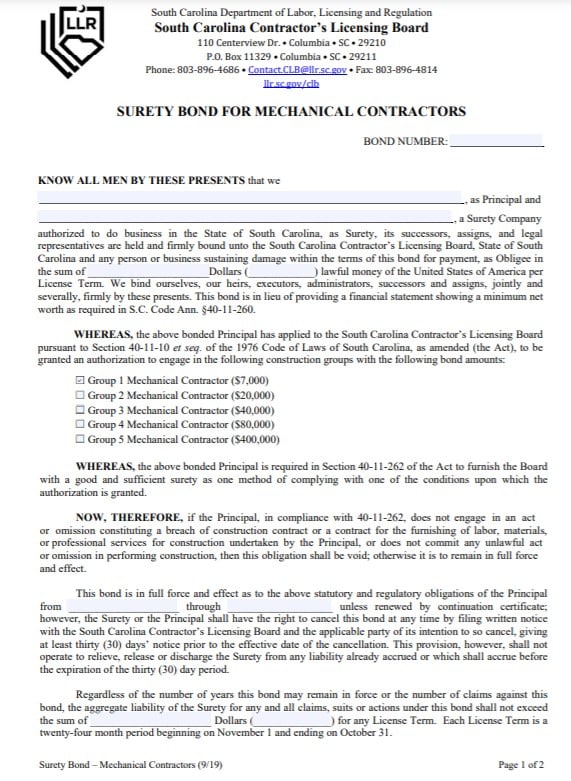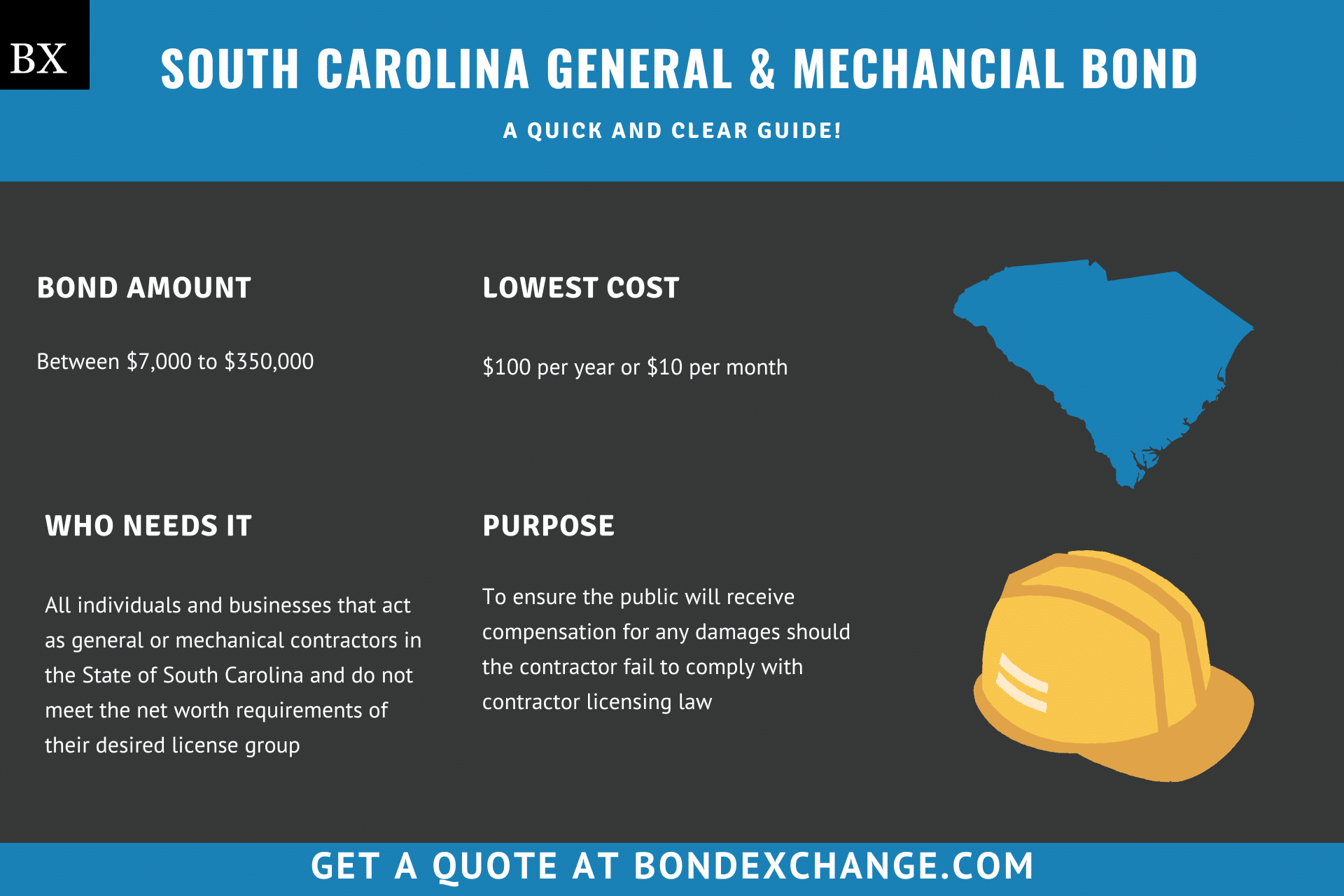South Carolina General and Mechanical Contractor License Bond: A Comprehensive Guide
*South Carolina Bill H4115 updated the net worth, licensing, and surety bond requirements for general and mechanical contractors in South Carolina. The bill went into effect on 5/26/2023. This page has been updated to reflect these changes.
This guide provides information for insurance agents to help contractors on South Carolina General and Mechanical Contractor License bonds.
At a Glance:
- Lowest Cost: $100 per year or $10 per month
- Bond Amount: Dependent on the contractor’s license group, as outlined in the table below:
Table 1.1
| License Type | Bond Amount |
|---|---|
| General Contractor (Group 1) | $20,000 |
| General Contractor (Group 2) | $60,000 |
| General Contractor (Group 3) | $150,000 |
| General Contractor (Group 4) | $250,000 |
| General Contractor (Group 5) | $350,000 |
| Mechanical Contractor (Group 1) | $7,000 |
| Mechanical Contractor (Group 2) | $15,000 |
| Mechanical Contractor (Group 3) | $30,000 |
| Mechanical Contractor (Group 4) | $60,000 |
| Mechanical Contractor (Group 5) | $300,000 |
- Who Needs It: All individuals and businesses that act as general or mechanical contractors in the State of South Carolina and do not meet the net worth requirements of their desired license group
- Purpose: To ensure the public will receive compensation for any damages should the contractor fail to comply with contractor licensing law
- Who Regulates General and Mechanical Contractors in South Carolina: The South Carolina Contractors License Board (CLB)


Background
South Carolina Code of Laws 40-11-30 requires general and mechanical contractors operating in the state to obtain a license with the CLB. The South Carolina legislature enacted the licensing laws and regulations to ensure that contractors engage in ethical business practices. In order to provide financial security for the enforcement of the licensing law, contractors must either submit a financial statement indicating their net worth or purchase and maintain a general and mechanical contractor license surety bond, limits are outlined in Table 1.1, to be eligible for licensure.
*Important Note: General and Mechanical Contractors are only required to obtain a license if they work on projects costing $10,000 or more.
What Is the Purpose of the South Carolina General and Mechanical Contractor License Bond?
South Carolina requires contractors who do not meet certain net worth requirements to purchase the General and Mechanical Contractor License Bond as part of the application process to obtain a general or mechanical contractor license. The bond ensures that the public will receive compensation for financial harm if the contractor fails to comply with the licensing regulations. In short, the bond is a type of insurance that protects the public if the contractor breaks licensing laws.
How Can an Insurance Agent Obtain a South Carolina General and Mechanical Contractor License Surety Bond?
BondExchange makes obtaining a South Carolina General and Mechanical Contractor License bond easy. Simply login to your account and use our keyword search to find the “contractor” bond in our database. Don’t have a login? Gain access now and let us help you satisfy your customers’ needs. Our friendly underwriting staff is available by phone (800) 438-1162, email or chat from 7:30 AM to 7:00 PM EST to assist you.
At BondExchange, our 40 years of experience, leading technology, and access to markets ensures that we have the knowledge and resources to provide your clients with fast and friendly service whether obtaining quotes or issuing bonds.
Not an agent? Then let us pair you with one!
Click the above image to find a BX Agent near you
Is a Credit Check Required for the South Carolina General and Mechanical Contractor License Bond?
Surety companies will run a credit check on the owners of the contractor company to determine eligibility and pricing for the South Carolina General and Mechanical Contractor License bond. Contractors with excellent credit and work experience can expect to receive the best rates. Contractors with poor credit may be declined by some surety companies or pay higher rates. The credit check is a “soft hit”, meaning that the credit check will not affect the contractor’s credit.
How Much Does the South Carolina General and Mechanical Contractor License Bond Cost?
The South Carolina General and Mechanical Contractor License surety bond can cost anywhere between 1% to 9% of the bond amount per year term. Monthly subscription options are also available. Insurance companies determine the rate based on a number of factors including your customer’s credit score and experience. The chart below offers a quick reference for the approximate bond cost on the $30,000 bond requirement.
Table 1.2
| Credit Score | Bond Cost (1 year) | Bond Cost (1 month) |
|---|---|---|
| 720+ | $300 | $30 |
| 680 – 699 | $600 | $60 |
| 660 – 659 | $750 | $75 |
| 625 – 659 | $900 | $90 |
| 600 – 624 | $1,200 | $120 |
| 575 – 599 | $1,500 | $150 |
| 550 – 574 | $1,800 | $180 |
| 525 – 549 | $2,250 | $180 |
| 500 – 524 | $2,700 | $270 |
*The credit score ranges do not include other factors that may result in a change to the annual premium offered to your customers, including but not limited to, years of experience and underlying credit factors contained within the business owner’s credit report.
How Does South Carolina Define “General Contractor”?
South Carolina Code of Laws 40-11-20 defines a general contractor as “an entity which performs or supervises or offers to perform or supervise general construction.”
How Does South Carolina Define “Mechanical Contractor”?
South Carolina Code of Laws 40-11-20 defines a mechanical contractor as an “entity which performs or supervises, or offers to perform or supervise, mechanical construction.”

BondExchange now offers monthly pay-as-you-go subscriptions for surety bonds. Your customers are able to purchase their bonds on a monthly basis and cancel them anytime. Learn more here.
How Do General and Mechanical Contractors Apply for a License in South Carolina?
Contractors in South Carolina must navigate several steps to secure their general and mechanical contractor license. Below are the general guidelines, but contractors should refer to the application packet for details on the process.
License Period – The South Carolina general contractor license expires on October 31 of every even-numbered year (2022, 2024 etc). The South Carolina mechanical contractor licenses expire on October 31 of every odd numbered year (2021, 2023 etc).
Step 1 – Determine the License Type
South Carolina requires contractors to obtain specific licenses corresponding to the nature in which the contractor’s business operates. Below are the different types of the South Carolina General and Mechanical Contractors License:
- General – Performs or supervises the installation, or repair of any building or structure
- Mechanical – Installs, replaces or repairs all plumbing, HVAC, refrigeration and electrical components of any building or structure
Step 2 – Determine the License Group
South Carolina limits the monetary value of work contractors are allowed to perform based on their license group. The CLB determines a contractor’s group based on their net worth. Contractors who do not meet the net worth requirements for their desired group can purchase a surety bond to be eligible for admittance into their desired group. Below are the different groupings for both the general and mechanical contractor licenses:
Table 1.3 (General)
| Group | Maximum Cost Allowed (per project) | Working Capital | Net Worth Requirement | Surety Bond Requirement |
|---|---|---|---|---|
| 1 | $100,000 | $10,000 | $20,000 | $20,000 |
| 2 | $400,000 | $40,000 | $60,000 | $60,000 |
| 3 | $1,000,000 | $100,000 | $150,000 | $150,000 |
| 4 | $3,000,000 | $175,000 | $250,000 | $250,000 |
| 5 | Unlimited | $250,000 | $350,000 | $350,000 |
Table 1.4 (Mechanical)
| Group | Maximum Cost Allowed (per project) | Working Capital | Net Worth Requirement | Surety Bond Requirement |
|---|---|---|---|---|
| 1 | $35,000 | $3,500 | $7,000 | $7,000 |
| 2 | $100,000 | $10,000 | $15,000 | $15,000 |
| 3 | $200,000 | $20,000 | $30,000 | $30,000 |
| 4 | $400,000 | $40,000 | $60,000 | $60,000 |
| 5 | Unlimited | $200,000 | $300,000 | $300,000 |
Step 3 – Register the Business
Contractors must register their business entity with the South Carolina Secretary of State. Contractors can register their business here.
Step 4 – Purchase a Surety Bond or Prepare a Financial Statement
Contractors who do not meet the net worth requirements for their desired group will need to purchase and maintain a general and mechanical contractor license surety bond. Contractors who do meet the net worth requirements will need to submit a financial statement with their application meeting the following criteria:
- Contractors in Groups 1 and 2 must submit a notarized financial statement
- Contractors in Groups 3 and 4 must submit a compiled financial statement prepared by a licensed CPA or PA
- Contractors in Group 5 must submit an audited financial statement prepared by a licensed CPA or P
Step 5 – Meet the Preliminary Qualifications
General and mechanical contractors will need to meet one of the following requirements prior to submitting their license application. All applicants will be required to pass the SC Business Management and Law for Commercial Contractors exam
- Exam – Contractors choosing to apply through examination will need to pass a both a technical exam and the SC Business Management and Law for Commercial Contractors exam. Contractors can schedule an exam appointment here. Contractors will also need to have at least two years of work experience as well.
- Reciprocity – Contractors who are currently licensed in any of the states listed on page 10 of the application packet will not be required to take any additional examinations
- Classifications with no Technical Exam – Contractors who have at least two years of work experience in the specific trade they are applying for can opt out of taking the technical exam
Step 6 – Complete the Application
All general and mechanical contractor regulatory license applications should be mailed to:
SC Contractor’s Licensing Board
PO Box 11329
Columbia SC 29211-1329
Contractors electing not to purchase a surety bond will need to submit a financial statement with their application
Step 7 – Pay Fees
Contractors will need to pay an application fee when submitting their license application. The fee is determined based on the date the application is submitted. The following table illustrates the application fee contractors will need to pay when submitting their license application.
Table 1.5
| Date the Application is Submitted | Application Fee (General) | Application Fee (Mechanical) |
|---|---|---|
| 8/1/20 – 7/31/21 | $350 | $175 |
| 8/1/21 – 7/31/22 | $175 | $350 |
| 8/1/22 – 7/31/23 | $350 | $175 |
How Do South Carolina General and Mechanical Contractors Renew Their License?
General and Mechanical contractors can renew their license online through the CLB’s licensing portal. The South Carolina general contractor license expires on October 31 of every even numbered year (2022, 2024 etc). The South Carolina mechanical contractor licenses expire on October 31 of every odd numbered year (2021, 2023 etc).
What Are the Insurance Requirements for the South Carolina General and Mechanical Contractors License?
The State of South Carolina does not require general and mechanical contractors to purchase any form of liability insurance. Contractors who do not meet the net worth requirements of their desired group will need to purchase and maintain a general and mechanical contractor license surety bond (limits outlined in Table 1.1)
How Do South Carolina General and Mechanical Contractors File Their Bond With The South Carolina CLB?
Contractors should mail the completed bond form, including the power of attorney, to the following address:
SC Contractor’s Licensing Board
PO Box 11329
Columbia SC 29211-1329
The general and mechanical contractor license surety bond requires signatures from both the surety company that issues the bond and the contractor. The surety company should include the following information on the bond form:
- Legal name and address of entity/individual(s) buying the bond
- Surety company’s name and address
- Bond amount
- Date the bond is signed and goes into effect
What Can Contractors Do to Avoid Claims Against the South Carolina General and Mechanical Contractor License Bond?
To avoid claims on the General and Mechanical Contractor License Bond, contractors must follow all license regulations in the state, including some of the most important issues below that tend to cause claims:
- Do not be negligent when performing contract work
- Do not abandon a job without a proper reason
- Do not engage in any acts of fraud
- Do not falsely advertise or misrepresent your abilities
- Do not engage in contract work outside the scope of your license
What Other Insurance Products Can Agents Offer Contractors in South Carolina?
South Carolina does not require general and mechanical contractors to obtain any form of liability insurance. However, most contractors will seek to obtain this insurance anyway. Bonds are our only business at BondExchange, so we do not issue liability or workers’ compensation insurance, but our agents often utilize brokers for this specific line of business. A list of brokers in this space can be found here.
How Can Insurance Agents Prospect for South Carolina General and Mechanical Contractor Customers?
South Carolina conveniently provides a public database to search for active general and mechanical contractors in the state. The database can be accessed here. Contact BondExchange for additional marketing resources. Agents can also leverage our print-mail relationships for discounted mailing services.
What other Contractor License Bonds are Required in South Carolina?
Contractors in South Carolina will need to obtain specific bonds correlating with their license type. Below are all the different contractor licensing bonds required by South Carolina:
- Licensed Residential Specialty Contractor (HVAC, Plumber, or Electrician) – $10,000 bond limit
- Registered Residential Specialty Contractor – $5,000 bond limit
- Residential Builder / Certificate of Authority – $15,000 bond limit

